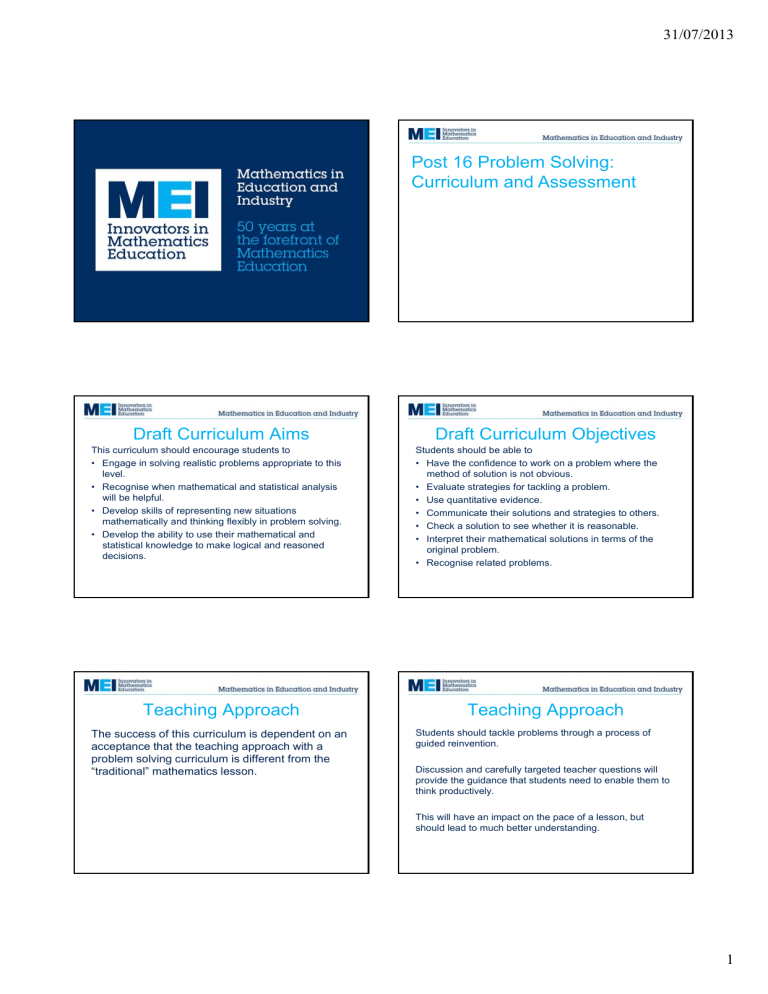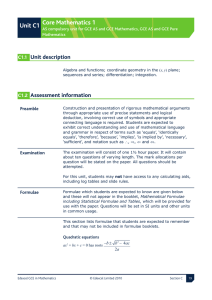Post 16 Problem Solving: Curriculum and Assessment Draft Curriculum Aims Draft Curriculum Objectives

Post 16 Problem Solving:
Curriculum and Assessment
31/07/2013
Draft Curriculum Aims
This curriculum should encourage students to
• Engage in solving realistic problems appropriate to this level.
• Recognise when mathematical and statistical analysis will be helpful.
• Develop skills of representing new situations mathematically and thinking flexibly in problem solving.
• Develop the ability to use their mathematical and statistical knowledge to make logical and reasoned decisions.
Draft Curriculum Objectives
Students should be able to
• Have the confidence to work on a problem where the method of solution is not obvious.
• Evaluate strategies for tackling a problem.
• Use quantitative evidence.
• Communicate their solutions and strategies to others.
• Check a solution to see whether it is reasonable.
• Interpret their mathematical solutions in terms of the original problem.
• Recognise related problems.
Teaching Approach
The success of this curriculum is dependent on an acceptance that the teaching approach with a problem solving curriculum is different from the
“traditional” mathematics lesson.
Teaching Approach
Students should tackle problems through a process of guided reinvention.
Discussion and carefully targeted teacher questions will provide the guidance that students need to enable them to think productively.
This will have an impact on the pace of a lesson, but should lead to much better understanding.
1
Teaching Approach
One phrase which was mentioned at the advisory group meeting which highlights this points is that this curriculum will include
“ the sophisticated use of sometimes simple mathematics rather than the trivial use of sophisticated mathematics”
Assessment
Must be
• Valid – testing the skills we want students to develop.
• Scalable – can test hundreds in a centre and thousands nationally.
• Not too expensive.
• Not easy to cheat.
31/07/2013
Miller’s Pyramid of Clinical Competence
• Proposed 1990 as a model for assessing medics
Assessment: things to decide
• Timed examination or something else?
• Timed examination and something else?
• How to ensure that students are given the opportunity to solve a problem?
• How to mark solutions to problems?
• Someone working at one level also shows all the competencies below it.
Encouraging Initial Response
• Edexcel and AQA
– Positive about the intended outcomes of the curriculum.
– Offered sound advice regarding working towards a commercially viable qualification.
Encouraging Initial Response
Peter Main from the Institute of Physics
A curriculum of this kind which encouraged students to
• make estimates
• consider the viability of solutions
• have a better understanding of risk with regard to issues such as nuclear energy and vaccination programs would be of use to scientists from a number of disciplines.
2
Encouraging Initial Response
The most encouraging aspect has been the response from schools and colleges.
Edexcel placed an item inviting schools who would like to try out some problem solving activities to contact us.
Within two days this generated over seventy emails and the tally now stands at close to a hundred schools.
This suggests that there is a genuine interest amongst schools and colleges for a curriculum of this type.
Initial Trials
Initial trials of the materials started this week.
These will be adapted and refined taking into account feedback from
• the advisory group
• learned societies
• the teachers and students involved in the trials
31/07/2013
To Conclude
There is still a long way to go before our work in this curriculum is completed. We are sure there will be many obstacles to overcome but sincerely believe that, if successful, it will lead to a much better and more fulfilling mathematics education for a large number of students.
3






